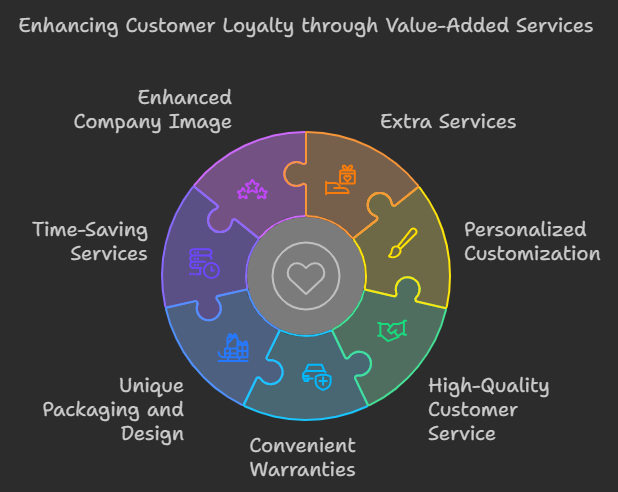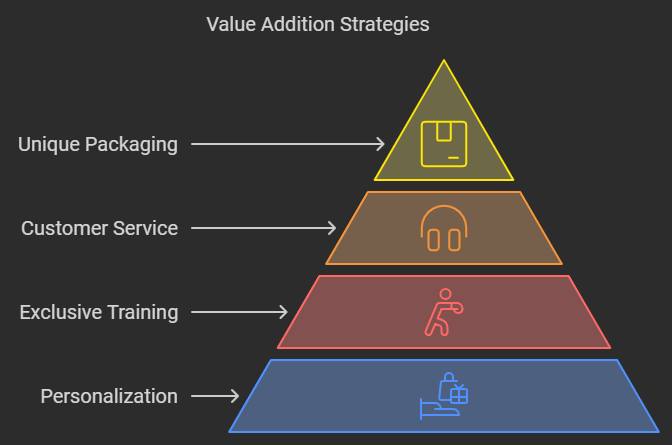Real-Life Examples of Value Adds in Business
In business, value adds are extra features or services that go beyond the basic offering and make a product or service more appealing to customers.
Real-life examples of value adds in business can be found in various industries, from retail and hospitality to technology and healthcare.
These value adds can range from complimentary wifi in a hotel to a free software upgrade for a product. They are designed to enhance the customer experience and differentiate a business from its competitors.
Let’s take a look at some specific examples of value adds that have made a significant impact in the business world.
Deciphering the Concept of Value Add in Business
The Essence of Value Add: A Simplified Understanding
Value add is about improving a product or service to increase its value.
This means providing extra services or features without significantly raising costs in a business context.
This can transform the customer experience, help businesses stand out, and boost revenue.
Value-added services include additional features, convenience services, customization, high-quality customer service, unique packaging, training, warranties, and time-saving services.
By offering these services, businesses can cultivate customer loyalty and improve their company’s image.
Tracing the Origin of the Value Add Terminology
The term “value add” originated in manufacturing. It means adding features or services to increase a product’s value.
It has evolved to include activities improving the customer experience and setting a product apart from competitors.
Shifts to service-based economies, technology advancements, and the focus on customer satisfaction have influenced its usage.
Sustainability and ethical business practices also drive businesses to include value-added initiatives.
Assessing Value Add Through Real Business Scenarios
Impactful Value-Added Services: Diving into Examples
Value-added services greatly impact customer loyalty and satisfaction in real business. For example, free delivery or extended warranties can improve customer experience and build loyalty. Customizing products to meet individual needs also keeps loyal customers happy.
There are many examples of unique features that have been used as value adds in business. These include personalized packaging, design, and customization options for specific customer preferences. Good customer service and accessible user experiences have also been helpful in many industries.
Specific examples show how value-added marketing has changed customer experiences and brand perception. For instance, time-saving services, product variety, better company image, and reputation have all played a role. Also, giving away small gifts and offering unique training and education opportunities have improved brand perception and customer experience, increasing customer satisfaction and loyalty.
The Strategic Dimension of Value-Added Marketing
How Value-Added Marketing Transforms Customer Experience
Value-added marketing transforms the customer experience. It provides extra services that enhance a product’s or service’s overall value without increasing its cost.
For example, providing additional features or functions, personalization, customization, high-quality customer service, unique packaging, and warranties are all ways in which value-added services can significantly improve the customer experience.
Unlike conventional marketing tactics, which focus on selling the product or service alone, value-added marketing goes the extra mile by offering additional services that show care for customers, help businesses stand out from the competition, and ultimately increase customer satisfaction. This approach prioritizes the overall customer experience rather than solely promoting the core product or service. By doing so, businesses can create a lasting and positive impression on customers, ultimately adding significant value to the business with just a little effort.
Illustrating the Power of Value-Added Marketing Through Brands
Value-added marketing improves the customer experience by offering extra services beyond the basic product or service. This can include additional features, convenience services, personalization, high-quality customer service, and unique packaging. By providing these added benefits, businesses show care for customers, stand out from competitors, and increase customer satisfaction, leading to higher revenue.
Examples of companies effectively using value-added marketing include those offering warranties, time-saving services, diverse product options, and image and reputation improvement. These showcase how businesses strategically position themselves with a unique value proposition, setting them apart from competitors.
Value-added marketing differs from conventional tactics in that it focuses on customer experience without increasing cost. It contributes to long-term customer loyalty and satisfaction with little effort.
Distinguishing Value-Added Marketing from Conventional Tactics
Value-added marketing is different from regular marketing. It focuses on adding value to a product or service rather than discussing its essential features.
For example, regular marketing might talk about a smartphone’s functions. But value-added marketing goes further. It offers extra services like personalized customer support, more extended warranties, or free training sessions.
This extra value aims to make customers happier and more loyal. Regular marketing mainly relies on price or product features.
Innovation and unique features are crucial in value-added marketing. They help businesses to stand out from the competition and create a memorable customer experience.
By continually adding innovative services, businesses can show that they care about their customers. This can increase customer satisfaction and make them different in the market.
Operationalizing Value-Added Services in Business

Showcasing How Value Adds Cultivate Customer Loyalty
Businesses can cultivate customer loyalty by providing extra services that enhance the customer experience without increasing costs. Offering additional features, personalized customization, high-quality customer service, and convenient warranties can show a commitment to customer satisfaction. These services can help businesses stand out and increase customer satisfaction.
A value-added reseller enhances the customer experience by providing product customization, technical support, and training services. These added services ultimately drive customer loyalty.
Businesses can also cultivate loyalty through unique packaging and design, time-saving services, and enhancing company image and reputation. By offering these services, enterprises demonstrate customer care and increase revenue while building long-term loyalty.
Expanding on the Notion of Value Adds with Examples
Value-added services help companies stand out from the competition and make customers happier. For instance, a gym offering free personal training sessions with a one-year membership adds value. Similarly, a phone company giving free screen protectors and phone cases with a new device purchase improves the customer experience without raising costs. Innovative features and personalized services are also important.
For instance, a tech company offering customized product configurations or a clothing brand that allows customers to personalize their own designs. Exclusive training and support also add value, like a software company giving free educational workshops to its users. These examples show how companies provide extra benefits, making their products or services more attractive to consumers.
Evaluating the Role of a Value-Added Reseller
Value-added resellers are important in the business ecosystem. They enhance products or services, making them more valuable. They can be evaluated based on their ability to improve customer experiences without increasing costs. The impact of their services can be measured through customer satisfaction, increased revenue, and better business reputation.
Harnessing Innovation and Unique Features as Value Adds

Personalization and Customization Initiatives as Value Boosters
Personalization and customization are important in business. They improve the customer experience by tailoring products and services to individual needs. This creates a sense of exclusivity and connection. For example, giving personalized product recommendations or offering customization options adds value.
These initiatives are crucial for showing a commitment to meeting individual needs, leading to increased customer satisfaction, loyalty, and long-term relationships. For instance, tailored fitness plans or personalized meal delivery services make customers feel valued, enhancing the value proposition.
Businesses can use data-driven insights to understand customer preferences and behavior, differentiating themselves and building a strong brand identity. Personalized marketing campaigns and customizable product features can effectively enhance the perceived value of offerings.
Exclusive Training and Support as Enhanced Service Offerings
Exclusive training and support can make a big difference for a business. They set the business apart from competitors and show a high care for customer satisfaction. They also add value and personalized assistance, increasing customer satisfaction and loyalty. This can help improve the business’s reputation and increase revenue by standing out and showing dedication to customer success.
Emphasizing Customer Service Excellence as a Vital Value Add
Customer service excellence is crucial for adding value to a business. It enhances the overall value of products or services through prompt, courteous interactions and efficient issue resolution. Providing outstanding customer service increases satisfaction, loyalty, and trust. It also sets a company apart from competitors and boosts its reputation, leading to increased revenue.
Businesses can integrate customer service excellence into their strategies by training and empowering employees. This includes investing in technology, gathering and acting on feedback, and regularly refining processes for continuous improvement. Companies can also provide educational resources and additional services to meet diverse customer needs.
Unique Packaging Design as a Subtle Value Add
Unique packaging design is important in making a product feel special. It looks good and makes the product seem more valuable, which can make people more interested in buying it and willing to pay more. Unique packaging also adds to the product’s purchasing experience, making customers feel excited and exceptional. Successful brands use unique packaging to make their products stand out and create a stronger connection with their customers, which helps them keep their customers happy and loyal.

Vizologi is a revolutionary AI-generated business strategy tool that offers its users access to advanced features to create and refine start-up ideas quickly.
It generates limitless business ideas, gains insights on markets and competitors, and automates business plan creation.


